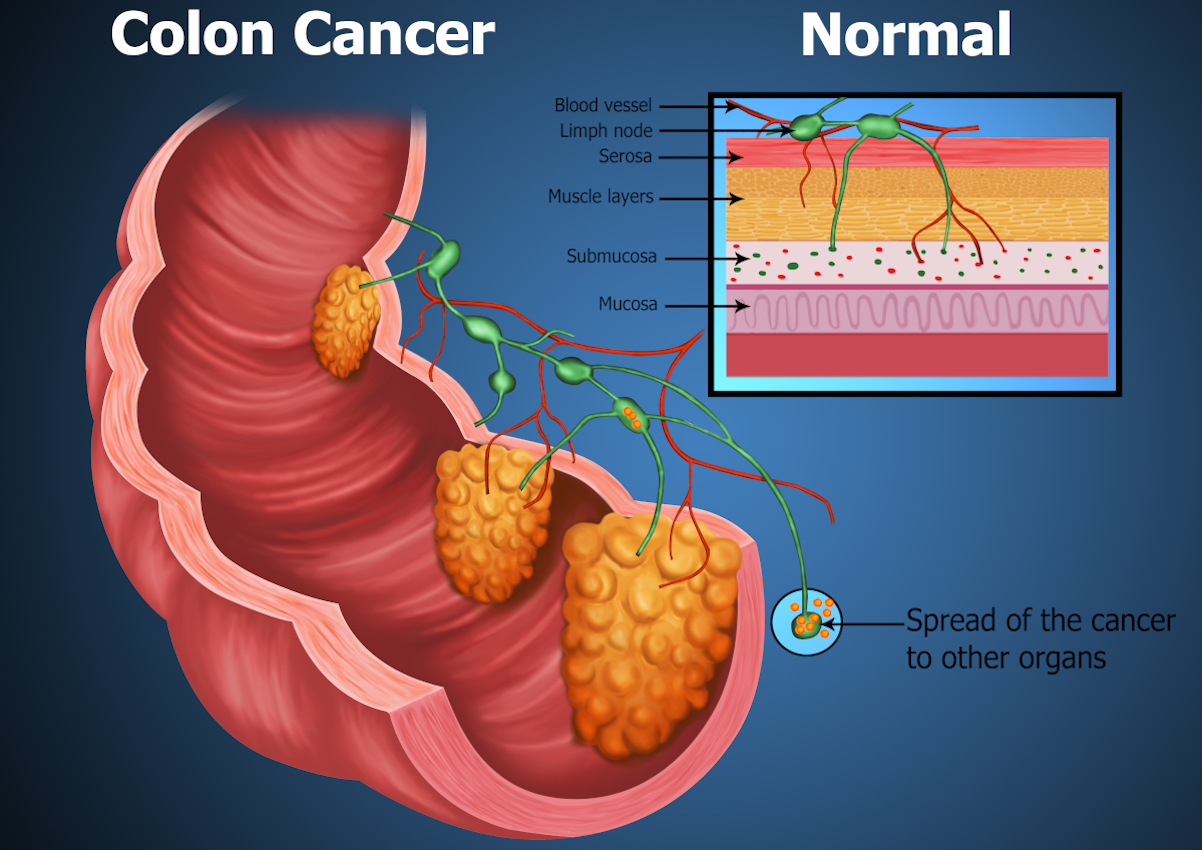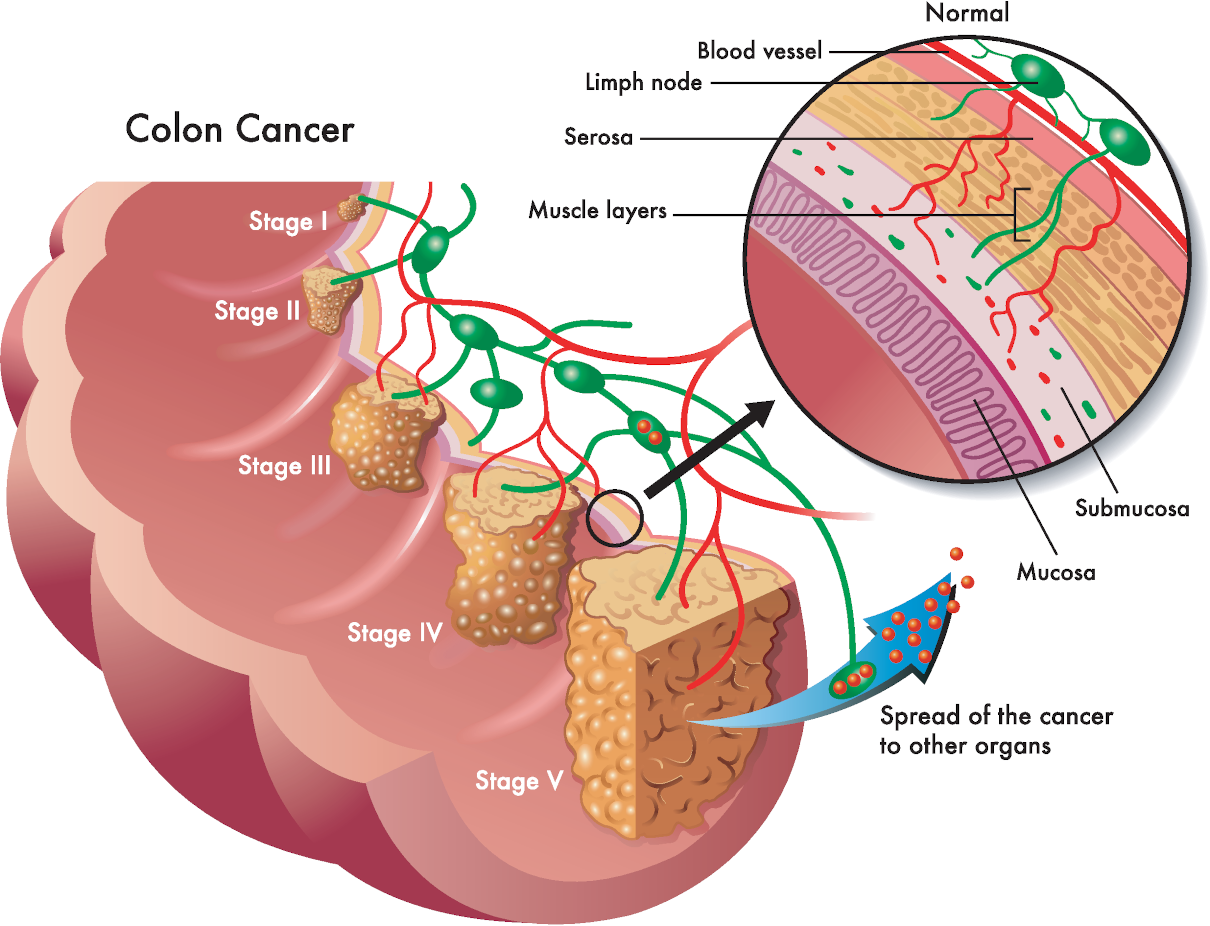
Regarding colon cancer, the prognosis is a great concern for most patients. Fortunately, several different methods are available today to assess a patient’s prognosis, with the analysis of the disease stage being the most crucial.
Let’s explore the four stages of colon cancer:
- Stage 1: At this early stage, the tumour remains within the intestinal wall, not having sprouted through it. Removing a small tumour in this stage implies a favourable prognosis for colon cancer, resulting in almost all patients surviving.
- Stage 2: The tumour extends beyond the intestinal wall and develops distant metastases. The prognosis becomes less favourable as the tumour grows and spreads to the lymph nodes. To improve outcomes, oncologists employ a variety of treatments, including adjuvant chemotherapy. This active development in metastatic colon cancer treatment aims to increase overall survival.
- Stage 3: At this point, the tumour covers the entire intestinal wall thickness. The prognosis worsens as the cancer progresses, necessitating effective treatment strategies such as chemotherapy.
- Stage 4: The tumour has now spread to the lymph nodes. This advanced stage of colon cancer poses greater challenges in terms of treatment. If cancer has penetrated vital organs like the liver, lung, bone, or brain, the disease becomes even more difficult to treat, resulting in a less favourable prognosis. Cases with single foci in the liver or lung tend to have a more positive outlook.
Anti-candida Mini Detox – three colonics with bicarbonate of soda
An intensive course of three cleansing colonics with bicarbonate of soda is taken over one week to kickstart a detox cleansing regime. It includes an initial consultation. Best offer of closed system colonic hydrotherapy in London.
Prognosis of colon cancer for survival evaluation
Survival evaluation is a vital aspect of assessing the prognosis of colon cancer. While this indicator has evolved, patients’ quality of life has significantly improved. The medical practice continues to advance, equipping doctors with clinical and pathological criteria that allow them to determine the potential aggressiveness of tumours, which are typically poorly differentiated, by studying biomaterials under a microscope.
The number of metastases greatly impacts the final prognosis. The more widespread the cyst has become, the worse the outlook becomes. When cancer invades critical organs like the liver, lung, bone, or brain, the disease becomes less treatable, resulting in a less favourable forecast than cases with isolated foci in these organs.
Doctors are now acquiring more information about molecular markers, enabling patients to undergo appropriate examinations. The identification of a mutation in the BRAF gene indicates an unfavourable prognosis. While delivering this news to patients can be challenging for doctors, they must inform patients about such gene mutations and poor prognoses. Encouragingly, modern science has developed targeted medications that effectively address this predictive marker.
Food intolerance test of 208 ingredients
This one is our most comprehensive food and drink test. The test analyses your client’s IgG antibody reactions to 208 food and drink ingredients. This test will highlight their food triggers and help you formulate an IgG-guided elimination diet together.
Prognostic
Looking ahead, scientists will likely discover additional prognostic markers to help select optimal treatment methods for colon cancer. This progress will lead to a better understanding of how to tailor individual chemotherapy using targeted drugs designed to counteract these mutations. Consequently, the prognosis of colon cancer depends on numerous factors, and adopting practices like colonic irrigation can help maintain a healthy body and reduce the risk of developing oncological conditions.
In conclusion, assessing the prognosis of colon cancer is paramount in patient care. By evaluating the disease stage, the presence of metastases, and molecular markers, doctors can provide patients with a comprehensive understanding of their prognosis. With ongoing advancements in medical research and targeted treatments, the prospects for improved outcomes and personalized therapies are promising. Prioritizing proactive measures and early detection can empower individuals to promote colon health and minimize the likelihood of developing colon cancer.
Alkalising colonic irrigation with sodium bicarbonate
Safe and effective colon hydrotherapy includes an initial consultation. Consequently, sodium bicarbonate delivered to the colon through hydrotherapy can kill off candida.










